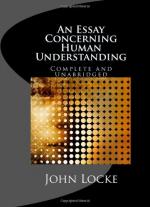
|
| Name: _________________________ | Period: ___________________ |
This test consists of 5 multiple choice questions, 5 short answer questions, and 10 short essay questions.
Multiple Choice Questions
1. Where does Locke say we see the origin of our idea of number?
(a) Trees in a forest.
(b) Our bodies and minds.
(c) Flocks of geese.
(d) Grains of sand.
2. What does Locke say words refer to?
(a) Things in the world.
(b) Experiences of pleasure and pain.
(c) Plants and animals.
(d) Inner ideas.
3. Who is guilty of reification, according to Locke?
(a) Metaphysical philosophers.
(b) Scientists.
(c) Historians.
(d) Materialist philosophers.
4. How has God formed man, according to Locke?
(a) To be warlike.
(b) To be sociable.
(c) To be self-seeking.
(d) To be devout.
5. What happens when you strip away all the details of a thing, in Locke's account?
(a) You know the design of the thing.
(b) You have the category of the thing.
(c) You possess the thing as an idea.
(d) You cease to see the thing.
Short Answer Questions
1. What abuse does Locke say is typical of scholars?
2. What are all words generated by, in Locke's account?
3. What is the limit toward which our idea of number extends, according to Locke?
4. What makes philosophers think that people do not have free will?
5. What does Locke say pleasure and pain are the foundation for?
Short Essay Questions
1. What do we do when we define a word, in Locke's account?
2. Where do the notions of good and evil come from, in Locke's opinion?
3. What is the correspondence theory of truth?
4. What does Locke say words ultimately refer to?
5. Why are most words general, according to Locke?
6. What does Locke say is the danger in man's freedom to use words however he likes?
7. Who does Locke say is guilty of these abuses?
8. What does Locke say is the difference between a free will and a free agent?
9. What problem is Locke trying to address with his discussion of identity in consciousness and identity in body?
10. What are three ways in which people abuse words, in Locke's account?
|
This section contains 762 words (approx. 3 pages at 300 words per page) |

|




